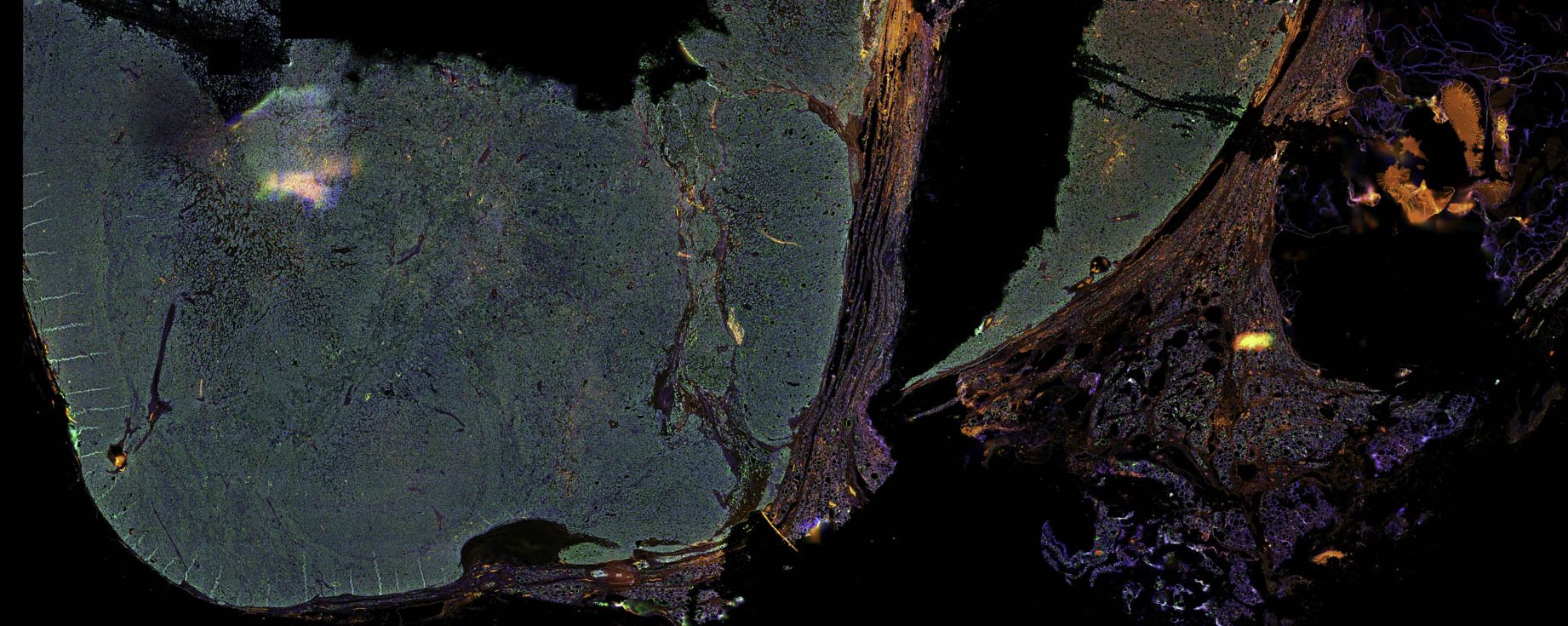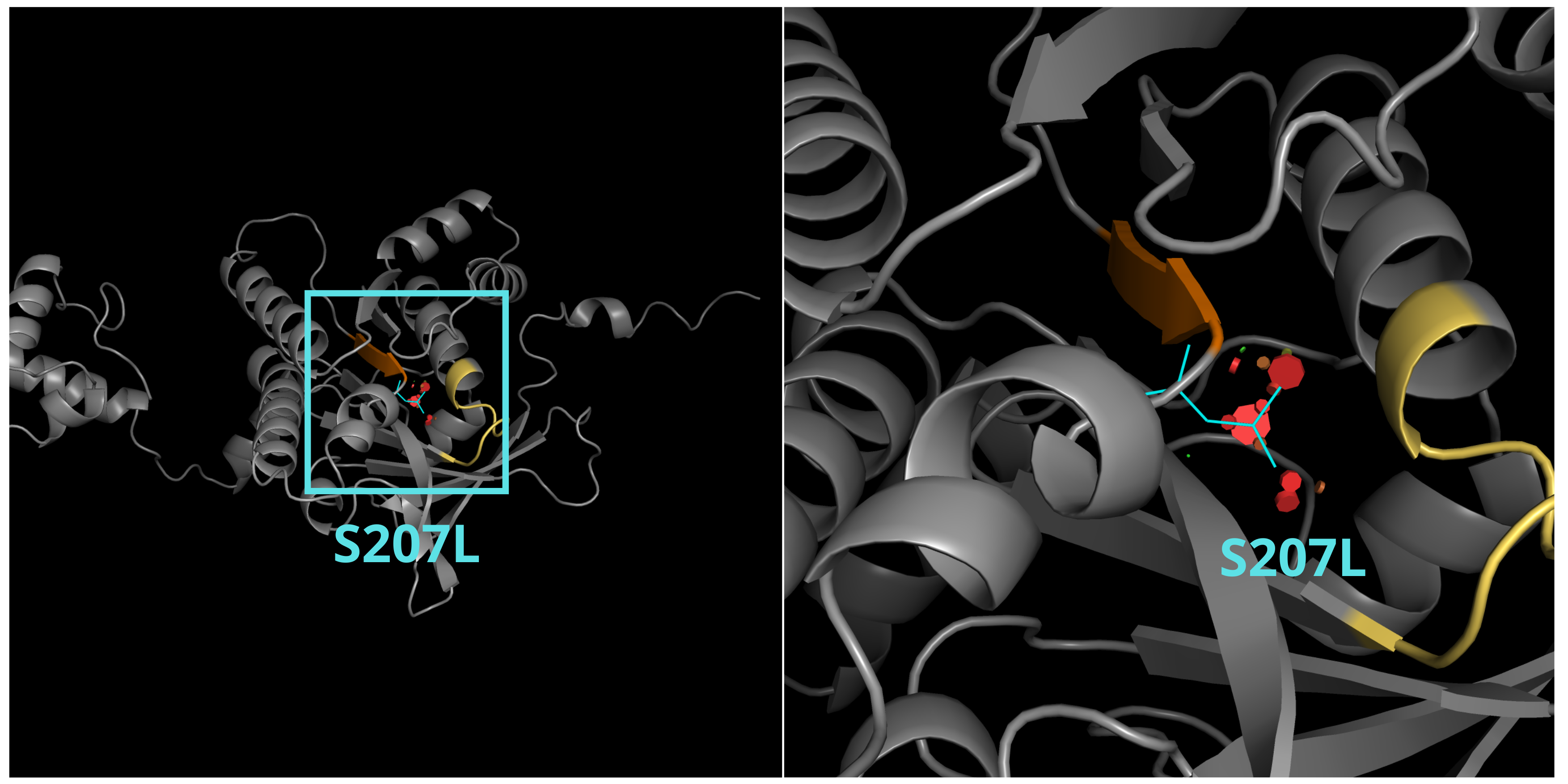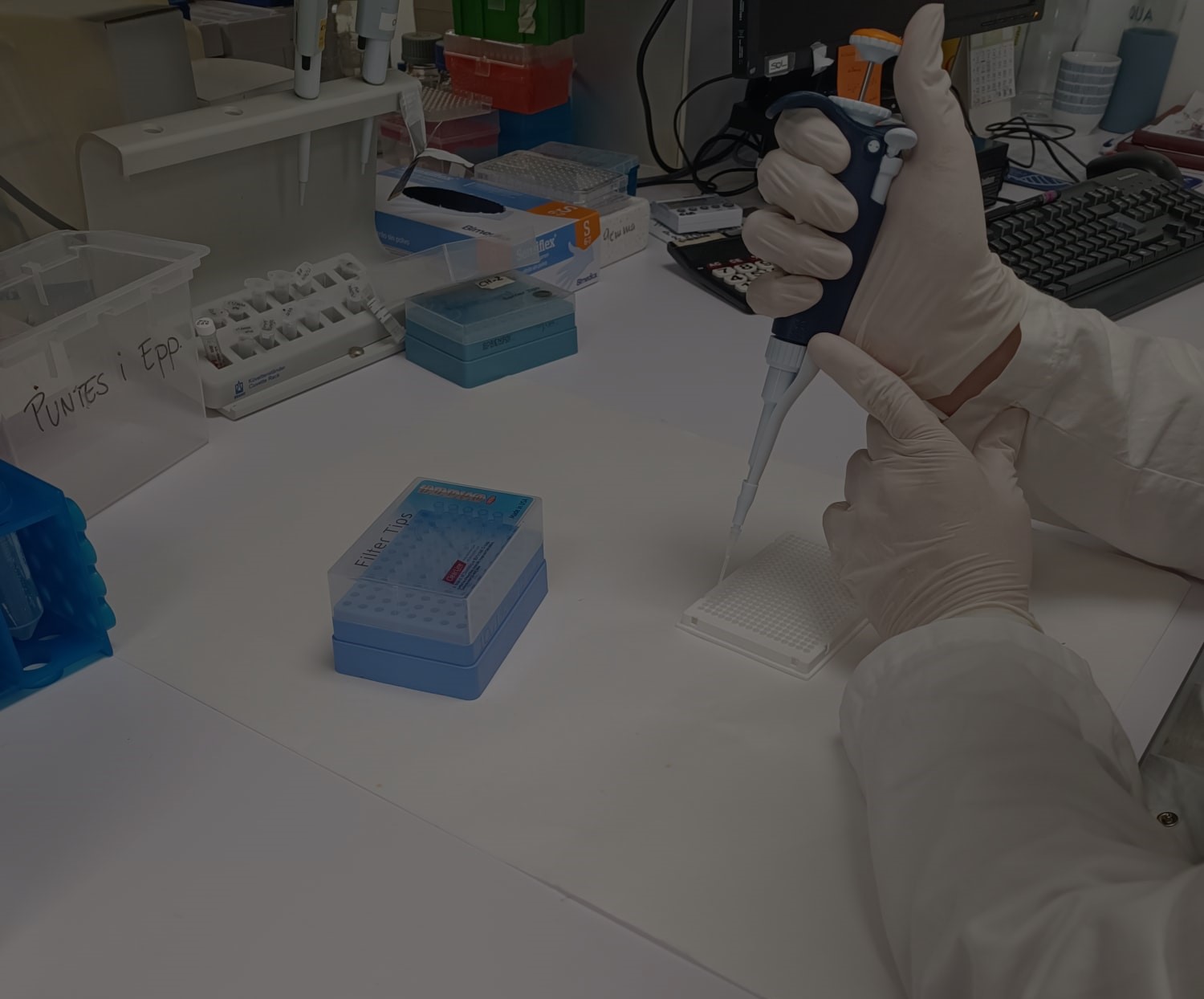About us
Why some patients develop rare tumors? Why do they develop both benign and malignant tumors? The main research focus of the Rare Tumor Syndromes’ Laboratory is the molecular and clinical characterization of rare syndromes predisposing to benign and malignant tumors. For example the syndromes associated to alterations in the miRNA biogenesis machinery.
Science for the benefit of patients is our biggest motivation; in particular, we investigate Rare Syndromes that predispose to the development of tumors early on life, affecting children and young adults. Our goal is to uncover the molecular cause of a novel syndrome or a particular tumor type from the believe that our efforts will have a positive impact in the disease understanding, the management of patients and the long run for a cure.

About the disease
Benign tumors are much more frequent than malignant ones and they can have severe impact in the patient’s quality of life. As an example, ovarian benign tumors can cause abdominal pain and hormonal disbalances; uterine myomas can cause pain, bleeding and infertility; thyroid nodules have an associated risk for misfunction of the thyroid gland and cancer risk, low grade gliomas might cause epilepsy, neurological problems and can progress to malignancy. Importantly, due to their incidence and associated co-morbidities, benign tumors are a burden to our economic health system.
Benign tumors are not rare, but hereditary forms of those are very rare. Why benign tumors do not become malignant? Our laboratory finds this a fascinating topic that we investigate in patients with a genetic susceptibility to understand the process from its germline roots. We believe that understanding how benign tumors remain “benign” can yield important clues of the malignant transformation process and thus be of extreme importance to fight cancer progression.
Group members
Principal investigators
Barbara Rivera
Principal Investigator
Cristina Rioja
Laboratory Manager
Barbara Rivera
Principal Investigator

Leads the Rare Tumors Laboratory of the Hereditary Cancer Program/Group at the IDIBELL.
Biologist and biochemist by training interested in the study of rare hereditary cancers to orientate personalized prevention strategies for patients at risk.
She obtained her PhD in 2012 by the University Autónoma of Madrid at the Human genetics group of the CNIO. In 2013, she joined the Human Genetics department of McGill University as a postdoctoral fellow. During this period, she unveiled the genetic cause and mechanistic of rare familial tumors including the description of a germline variant in FGFR1 causing familial forms of Low grade glioneuronal tumors and the discovery of a novel tumor susceptibility syndrome caused by a germline pathogenic variant in the microprocessor DGCR8. In 2018, she became an assistant professor at the Gerald Bronfman department of Oncology at McGill starting her own independent projects in pediatric tumor susceptibility syndromes.
In 2020, she joined the IDIBELL as a La Caixa-Junior Leader while continuing to serve as an adjunct professor at the Gerald Bronfman department of Oncology (McGill). The same year she joined the Scientific Program Committee of the European Society of Human Genetics.
Currently she holds a Miguel Servet position and develops her research program to understand the molecular underpinnings of rare tumor syndromes that affect children and young adults. A central topic of her research is the molecular mechanistic balance that promotes the susceptibility and development of benign and low-grade tumors.
Cristina Rioja
Laboratory Manager

Cristina Rioja is the lab manager of Rare Tumors Laboratory at the IDIBELL. She holds a PhD in Molecular Biology from the University of Salamanca and a MSc in Biotechnology from the Public University of Pamplona. As a postdoctoral researcher at the Western University (Canada), she specialized in functional genomics and reciprocal transcriptomics in plant-pest interactions. Later, as postdoctoral researcher at the University of Copenhagen, she focused on epigenetics and plant metabolomics.
Currently she is interested in developing and setting up state-of-the-art genomic approaches for tumor profiling. In addition, she coordinates the IDIBELL node of “Network for Rare Tumors of the Ovary”, focused on monitoring rare ovary tumors world-wide to improve their diagnosis and provide an equal access to medical expertise and innovative treatments for all patients.
Postdoctoral researchers
Jacopo Boni
Postdoctoral Fellow
Jacopo Boni
Postdoctoral Fellow

Jacopo Boni is a Juan de La Cierva Postdoctoral fellow with a strong background in kinases and cancer cell signaling. He obtained his PhD in Biomedicine from the Universitat Pompeu Fabra (UPF) in Barcelona studying DYRK kinases and their role as tumor drivers at the Centre for Genomic Regulation (CRG).
His current research work in the lab mainly focuses on uncovering the molecular events driving early brain tumorigenesis, with the aim of identifying novel targets for the treatment of low-grade glioma.
PhD students
Anne-Sophie Chong
PhD student
Clara Nogué
PhD student
Carla Roca
PhD student
Anne-Sophie Chong
PhD student

Anne-Sophie Chong is a laCaixa INPhINIT PhD fellow from Montreal. While completing her BSc in Anatomy and Cell Biology (McGill University), she joined a cancer genetics laboratory. In 2021, she completed a Master’s degree in Human Genetics (McGill University) investigating the genetic drivers of thyroid nodules and non-epithelial ovarian tumours. Her current research focuses on the role of miRNA deregulation in the development of thyroid lesions.
Clara Nogué
PhD student

Clara Nogué is a biotechnologist specialized in the health area. Later she took a master’s in translational medicine at the Universitat de Barcelona (UB) and the IDIBELL.
Currently, she carries out her PhD studies focusing on rare cancer syndromes due to alterations in the miRNA biogenesis pathway, particularly in the characterization of DGCR8 syndrome.
Carla Roca
PhD student

Carla Roca is a Geneticist specialized in Bioinformatics as she completed a master’s degree in Bioinformatics and Biostatistics and complementary training in Machine Learning after getting her Bachelor’s degree in Genetics.
She is currently pursuing a doctoral degree at IDIBELL in defining clinical and molecular insights of ovarian Sex Cord-Stromal Tumors. The project is part of an international initiative that aims to build a knowledge resource for rare ovarian tumors to improve their diagnosis and prognosis.
Scientific Support
Lluis Salvador
Research Assistant
Lluis Salvador
Research Assistant

Lluis Salvador graduated in 2021 as a medical doctor from the Hospital Clínic, Universitat de Barcelona. After completing his bachelor thesis, Lluis was granted a Summer Internship Program at IDIBELL and joined the Rare Tumors Laboratory where he devotes his efforts to the study the genetics of Gorlin syndrome, a multi-tumor predisposition disease. Currently he combines his research interest in Gorlin syndrome with his position as a research assistant in the Genetic Cancer Counselling Unit of the ICO.
Research Assistants
Míriam Fernández
Laboratory Technician
Míriam Fernández
Laboratory Technician

Míriam Fernández is a biochemist specialized in molecular and cell biology. After finishing her bachelor’s degree at Universitat de Barcelona, she performed a master’s degree in Biomedical Research at Universitat Pompeu Fabra. While completing her studies, she joined a group at the Institut of Bioengineering of Catalonia (IBEC) where she got experience in the development and biological characterization of 3D in-vitro models. Currently she is the technician of the Rare TumorS Lab where she focuses on the generation of CRISPR/CAS edited cell models.
PhD students
HyeRim Han
PhD student
HyeRim Han
PhD student

HyeRim Han is a PIF-SALUT (PERIS) Predoctoral Fellow at the Bellvitge Institute for Biomedical Research (IDIBELL) in Barcelona, Spain. She is currently undergoing a Graduate Research Traineeship in Human Genetics at the Lady Davis Institute in Montreal, Quebec, Canada. Experienced in cell biology and proteomics analysis, her research focuses on the mechanisms for susceptibility and tumorigenesis in pediatric CNS tumors.

Leads the Rare Tumors Laboratory of the Hereditary Cancer Program/Group at the IDIBELL.
Biologist and biochemist by training interested in the study of rare hereditary cancers to orientate personalized prevention strategies for patients at risk.
She obtained her PhD in 2012 by the University Autónoma of Madrid at the Human genetics group of the CNIO. In 2013, she joined the Human Genetics department of McGill University as a postdoctoral fellow. During this period, she unveiled the genetic cause and mechanistic of rare familial tumors including the description of a germline variant in FGFR1 causing familial forms of Low grade glioneuronal tumors and the discovery of a novel tumor susceptibility syndrome caused by a germline pathogenic variant in the microprocessor DGCR8. In 2018, she became an assistant professor at the Gerald Bronfman department of Oncology at McGill starting her own independent projects in pediatric tumor susceptibility syndromes.
In 2020, she joined the IDIBELL as a La Caixa-Junior Leader while continuing to serve as an adjunct professor at the Gerald Bronfman department of Oncology (McGill). The same year she joined the Scientific Program Committee of the European Society of Human Genetics.
Currently she holds a Miguel Servet position and develops her research program to understand the molecular underpinnings of rare tumor syndromes that affect children and young adults. A central topic of her research is the molecular mechanistic balance that promotes the susceptibility and development of benign and low-grade tumors.

Cristina Rioja is the lab manager of Rare Tumors Laboratory at the IDIBELL. She holds a PhD in Molecular Biology from the University of Salamanca and a MSc in Biotechnology from the Public University of Pamplona. As a postdoctoral researcher at the Western University (Canada), she specialized in functional genomics and reciprocal transcriptomics in plant-pest interactions. Later, as postdoctoral researcher at the University of Copenhagen, she focused on epigenetics and plant metabolomics.
Currently she is interested in developing and setting up state-of-the-art genomic approaches for tumor profiling. In addition, she coordinates the IDIBELL node of “Network for Rare Tumors of the Ovary”, focused on monitoring rare ovary tumors world-wide to improve their diagnosis and provide an equal access to medical expertise and innovative treatments for all patients.

Jacopo Boni is a Juan de La Cierva Postdoctoral fellow with a strong background in kinases and cancer cell signaling. He obtained his PhD in Biomedicine from the Universitat Pompeu Fabra (UPF) in Barcelona studying DYRK kinases and their role as tumor drivers at the Centre for Genomic Regulation (CRG).
His current research work in the lab mainly focuses on uncovering the molecular events driving early brain tumorigenesis, with the aim of identifying novel targets for the treatment of low-grade glioma.

Anne-Sophie Chong is a laCaixa INPhINIT PhD fellow from Montreal. While completing her BSc in Anatomy and Cell Biology (McGill University), she joined a cancer genetics laboratory. In 2021, she completed a Master’s degree in Human Genetics (McGill University) investigating the genetic drivers of thyroid nodules and non-epithelial ovarian tumours. Her current research focuses on the role of miRNA deregulation in the development of thyroid lesions.

Clara Nogué is a biotechnologist specialized in the health area. Later she took a master’s in translational medicine at the Universitat de Barcelona (UB) and the IDIBELL.
Currently, she carries out her PhD studies focusing on rare cancer syndromes due to alterations in the miRNA biogenesis pathway, particularly in the characterization of DGCR8 syndrome.

Carla Roca is a Geneticist specialized in Bioinformatics as she completed a master’s degree in Bioinformatics and Biostatistics and complementary training in Machine Learning after getting her Bachelor’s degree in Genetics.
She is currently pursuing a doctoral degree at IDIBELL in defining clinical and molecular insights of ovarian Sex Cord-Stromal Tumors. The project is part of an international initiative that aims to build a knowledge resource for rare ovarian tumors to improve their diagnosis and prognosis.

Lluis Salvador graduated in 2021 as a medical doctor from the Hospital Clínic, Universitat de Barcelona. After completing his bachelor thesis, Lluis was granted a Summer Internship Program at IDIBELL and joined the Rare Tumors Laboratory where he devotes his efforts to the study the genetics of Gorlin syndrome, a multi-tumor predisposition disease. Currently he combines his research interest in Gorlin syndrome with his position as a research assistant in the Genetic Cancer Counselling Unit of the ICO.

HyeRim Han is a PIF-SALUT (PERIS) Predoctoral Fellow at the Bellvitge Institute for Biomedical Research (IDIBELL) in Barcelona, Spain. She is currently undergoing a Graduate Research Traineeship in Human Genetics at the Lady Davis Institute in Montreal, Quebec, Canada. Experienced in cell biology and proteomics analysis, her research focuses on the mechanisms for susceptibility and tumorigenesis in pediatric CNS tumors.

Míriam Fernández is a biochemist specialized in molecular and cell biology. After finishing her bachelor’s degree at Universitat de Barcelona, she performed a master’s degree in Biomedical Research at Universitat Pompeu Fabra. While completing her studies, she joined a group at the Institut of Bioengineering of Catalonia (IBEC) where she got experience in the development and biological characterization of 3D in-vitro models. Currently she is the technician of the Rare TumorS Lab where she focuses on the generation of CRISPR/CAS edited cell models.
Publications
List of scientific publications from the Rare TumorS Lab
Projects
Underpining the effects of defective miRNA biogenesis in the formation of thyroid tumors

01/03/2020 — 31/03/2025
Germline pathogenic variants in DICER1 predispose to the development of multiple tumors during childhood. The most prevalent phenotype is multinodular goiter (MNG) that can be associated to highly lethal rare cancers like pleuropulmonary blastoma, pineoblastoma, pituitary blastoma and anaplastic sarcoma of the kidney. DGCR8, another member of the miRNA processing machinery, has been pinpointed as… Read more »
To uncover the genetic causes of Gorlin-like patients without an identified molecular cause.

01/01/2021 — 01/12/2024
Nevoid basal cell carcinoma syndrome (NBCCS) is characterized by mutations in the gene PTCH1, a tumor suppressor with a central role in the Sonic Hedgehog pathway in up to 85% of the cases. We identified a patient initially diagnosed with a mosaic version of Gorlin syndrome and carried a mosaic mutation in the oncogene SMOdownstream… Read more »
Clinical and molecular characterization of novel subtypes of Sex Cord-Stromal Tumors of the ovary

01/09/2019 — 01/05/2025
Non-epithelial cancers of the ovary are uncommon with malignant ones representing approximately 10% of all ovarian cancers. Due to their low incidence their classification remains challenging and while some are indolent most of them have serious implications in the patient health from hormonal disbalances to infertility. There are subtypes associated to hereditary diseases and to… Read more »
Clarifying the phenotypic spectrum associated with RAD51 partners and the proteomic interplay of RAD51 paralogs.

01/01/2022 — 31/12/2024
Alterations in different components of the DNA repair machinery are known to be responsible for several cancer susceptibility syndromes with a high implication in breast and ovarian cancer susceptibility as well as in familial colorectal cancer. RAD51C and RAD51D paralogs were incorporated to the ovarian cancer susceptibility gene list last decade. Currently we focus on… Read more »
Building the Network of Rare Ovarian Tumors (NRTO), an intercontinental initiative

01/01/2022 — 31/12/2024
The Network of Rare Ovarian Tumors (NRTO) is an international strategy led by researchers at McGill University and IDIBELL to set up a public registry and biobank for rare tumors of the ovary that will aid in the classification and diagnostics of these tumors as well as in the generation of an open source PDX… Read more »
IMPaCT-VUScan: Development and implementation of a functional genomics platform for undiagnosed hereditary cancer

01/01/2023 — 31/12/2025
IMPaCT-VUScan is an initiative that aims to identify variants of unknown significance (VUS) in suspected hereditary cancers. The IMPaCT-Genómica initiative has already developed a basic platform and workflows to evaluate unsolved cases with suspected genetic diseases, including hereditary cancer cases. However, it is expected that multiple VUS will be identified in most, if not all,… Read more »
Characterization of the novel DGCR8-microprocessor syndrome

16/03/2023 — 31/03/2024
We have recently discovered that a germline variant in the microprocessor DGCR8 to be responsible for a hereditary syndrome featuring multinodular goiter and peripheral schwannomatosis that is now recognized by the WHO -IARC on their new edition of Genetic Tumor Syndromes. We are keen on defining the phenotypic spectrum of this novel entity, understand the… Read more »
Elucidating the molecular mechanisms driven by FGFR1 mutants in Low Grade Gliomas

01/10/2023 — 01/10/2023
Dysembryoplastic neuroepithelial tumors (DNETs) are low grade brain tumors due to oncogenic alterations in the FGFR1 gene. We showed that inherited mutations in FGFR1 are responsible for familial form of this disease. Thorough characterization of these tumors allowed us to identify a high prevalence of multiple mutants in cis as a feature of DNETs, suggesting… Read more »
IMPaCT Genómica: Implementation of Precision Medicine in the Spanish National Health System.

01/05/2020 — 31/12/2023
The Cancer Working Package (WP4) of the IMPaCT Genómica program aims to improve the diagnosis, prevention, and treatment of suspected hereditary cancers and cancers of unknown origin that have not been resolved with the current tools of the healthcare system. The WP4 team, led by Dr. Gabriel Capellà (IDIBELL) collaborates with over 80 healthcare professionals… Read more »
Media
News
5
Videos
2
Funding

Fundación "la Caixa"

Fundación Mutua Madrileña

Instituto de Salud Carlos III

Cancer Research Society

Foundation for Childhood Cancer

Borroughs Wellcome Fund

Mia Neri Foundation

AGAUR
Department of Defense, United States of America
Contact
If you have any doubts or concerns about this research team, contact us by filling this form
